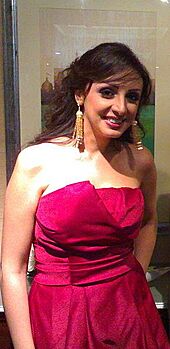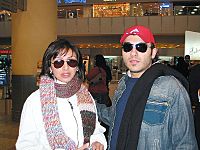Angham facts for kids
Quick facts for kids
Angham
|
|
|---|---|
| أنغام | |
 |
|
| Born |
Angham Mohamed Ali Suleiman
أنغام محمد على سليمان 19 January 1972 |
| Occupation |
|
| Years active | 1987–present |
| Spouse(s) |
Magdy Aref
(m. 1994–2003)Fahd Al-Shalabi
(m. 2004–2008)Ahmed Ezz
(m. 2011–2012)Ahmed Ibrahim
(m. 2019–2020) |
| Musical career | |
| Genres |
|
| Instruments |
|
| Labels |
|
Angham Mohamed Ali Suleiman (Arabic: أنغام محمد على سليمان; born on January 19, 1972), known simply as Angham, is a famous singer and actress from Egypt. She started her music career in 1987 with help from her father, Mohammad Suleiman.
After some changes in her personal life around 2000, Angham took more control over her music and image. Her album Leih Sebtaha (Why Did You Leave Her) helped her become a strong voice in Middle Eastern music. She later joined Rotana Records, another big music company.
In 2005, she released Bahibbik Wahashteeny (I Love You, I Miss You). Then, in 2007, Angham made a big comeback with Kolma N'arrab (Whenever We Come Closer). This album sold over 500,000 copies in the Middle East in just three months, earning her a platinum award.
Contents
Early Life and Musical Beginnings
Angham was born in Alexandria, Egypt. She is the oldest child of Mohammad Suleiman, who was a violinist, composer, and singer. Her mother, Mageda Abdel Haleem, is also an artist. Angham grew up in a Muslim family.
Later, her family moved to Cairo, settling in El Mohandiseen, an area where many famous people live. Angham has three siblings. Her brother, Khaled, studied music.
Angham started singing when she was about sixteen, guided by her uncle, Emad Abdel Haleem. Her first public performance was at Cairo's Radio syndicate ceremony. She sang "el Gannah Taht Akdamek," a song for mothers.
After high school, Angham studied at Cairo's Conservatory of Music. She learned music basics, improved her voice, and learned to play the piano and Oud.
Starting Her Career with Her Father (1987–1994)
Angham's first album, Fil Rokn elBaeed elHady (In The Far Distant Corner), came out in 1987. Her father introduced her to Sayed Naser, a record producer, who helped her make her first records. Angham was the first and youngest artist to join Sayed Naser Records.
Because her father was well-known, famous composer Mohammed Abdel Wahab even gave Angham the rights to his song "Basbosa." Many of her early songs were composed by her father.
Her second album, Awal Gawab (The First Answer), was released soon after. It was a tribute to Egyptian composer Sayed Makkawy. Angham worked with many lyricists on this album.
Over the next few years, Angham released more albums like "LaLiLi Lali," "Layek," "Ettafakna," and "Bibassata Kida." These albums explored themes of love, friendship, and family. In 1992, she sang two songs composed by Saudi composer Mohammed Al-Senan.
Around 1992, Angham started to work less with her father as she wanted to become more independent. Her album "Intal Alam" ("You Are The World") was released that year. The album Ella Ana ("Except Me") in 1993 was very successful, with popular songs like "Telephonak Kam" ("What's Your Number").
Becoming Independent and Exploring New Sounds (1995–2000)
After working less with her father, Angham started collaborating with composer Ameer Abdel Mageed. He composed all the songs for her 1995 album, Baollak Eih (Tell You What). This album included songs with quick Latin/Spanish beats, which helped her reach a younger audience.
In 1996, Angham released Akdar ("I Can"), also composed by Ameer Abdel Mageed. This album showed she could succeed without her father's constant guidance. She also tried singing in the Gulf dialect and released "Shay Daa" ("Something Got Lost") in 1996. This album was a big hit in the Persian Gulf region, leading to performances in Qatar, Kuwait, and UAE.
Angham returned to Rotana in 1997 with Betheb Meen ("Who Do You Love"). She worked with her father on two songs for this album, showing that their personal relationship was still strong. Her second Gulf album, "Khalli Bokra L'Bokra" (Keep Tomorrow For the Future), released in 1998, was even more successful.
Her 1999 album, Wahadaniya ("Lonely Woman"), produced by Sawt elCahira Records, was also very popular. Songs like "Bet'hebbaha Walla" ("Do You Love Her Or What") and "Baatly Nazra" ("Send Me A Glance") were big hits. Angham won "Best Female Artist" in 2000 for "Wahadaniya" and "Best Music Video" in 1999 for "Bethebbaha Walla."
New Image and Big Success (2001–2003)
In 2000, Angham and her husband Magdy Aref separated. After this, Angham took more control over her career. Her album 'Leih Sebtaha' (Why Did You Leave Her), released in 2001, featured the hit song "Sidi Wisalak" ("Your Charm"). This album allowed Angham to show a more confident and artistic side. She said this album was about doing what she had always dreamed of.
"Sidi Wisalak" was a huge success. Both "Sidi Wisalak" and "Magabsh Serty" ("Did He Mention Me") helped boost sales, making her the best-selling Egyptian female artist at the time. In 2001, she was officially honored as "Egypt's Number 1 Female Artist."
In 2003, Angham released her sixteenth album, Omry Maak ("My Life With You"). This album included more R&B, Rock 'n' Roll, and ballad songs. The songs "Omry Maak" and "Arrefha Beya" ("Introduce Me To Her") became number one hits in the Middle East. Omry Maak became one of Angham's best-selling albums.
In 2004, Angham released the single "Khaleeny Maak" ("Keep Me With You") for Valentine's Day.
Challenges and Comeback (2004–2008)
Angham's album Bahibbik Wahashteeny ("I Love You, I Miss You"), released in July 2005, faced some challenges. She had joined Rotana in 2004. Due to personal life events, including her marriage and pregnancy, it was hard for her to focus on promoting the album. The main song, "Bahibbik Wahashteeny", received good reviews, and its music video showed her real pregnancy.
Despite efforts to promote the album, it was not as commercially successful as her previous ones. However, Angham continued to perform, including a concert in Tunisia and appearances on TV shows like Star Academy. She also won the "Voice Of Love" Award in 2006 at the Alexandria National Music Festival.
In 2007, Angham made a big return with her eighteenth album, Kolma N'arrab (Whenever We Come Closer). She worked with many different music arrangers for this album. Kolma N'arrab became the best-selling album by a female artist in the Middle East in 2007. It earned her a platinum award. Her music video for "Kolma N'arrab" was very popular, reaching number one on music charts.
Angham appeared on many TV shows to promote her album and performed successful concerts. Kolma N'arrab was even nominated for Best Selling Record at the World Music Award 2007. In 2008, she continued to perform and appear on TV, including a concert at the Doha's 9th Music Festival. Her song "Mabataallemsh" (Never Learning) from her 2005 album was filmed as a music video and also topped the charts.
Nefsy Ahebak and Beyond (2009–Present)
Angham spent two years working on her nineteenth album, Nefsy Ahebak, which was released on June 25, 2009. For this album, she recorded the song "Mahzouma" (Defeated) in Prague with the Philharmonic Orchestra of Prague. This was a very expensive song to produce, making it one of the most costly songs in the Middle East by a female artist.
The album was well-received by both critics and fans. Angham also filmed a music video for the song "Saat Keteer." She has continued to release new music, with her latest album, Tegy Nsseeb (Let's Break Up), released in 2024.
Acting Career
Angham started taking acting lessons in 2000. Her first acting role was in the romantic comedy play Leila Men Alf Leila (Night of a Thousand Nights). She starred alongside famous actors like Yehia elFakharany. This play was a big project, but it only ran for two months and was not shown on television.
Her second acting experience was in the play Rossassa fil Alb (Bullet Right in the Heart). Angham enjoyed both acting experiences but found stage acting very tiring, as it required her to put her singing career and personal life on hold.
Rossassa fil Alb was Angham's most successful acting role. She received many movie offers after that, but she chose to focus on her singing career. She turned down roles in films like Sahar elLayali (Sleepless Nights) and Aan elAshk Wel Hawa (About Love and Passion).
Personal Life
Angham has spoken about her relationship with her father, saying she owes him a lot and is lucky to have him as a father and a music figure. Her decision to become more independent in her career helped her establish herself in the music industry.
In 1999, Angham married Magdy Aref, a businessman and music video director. They had a son named Omar. Their divorce in 2000 was widely reported. Angham remained single for four years before marrying music arranger Fahd in April 2004. They had a son named Abdel Rahman in December 2005. However, Angham and Fahd divorced in June 2008.
Angham was also briefly married to Egyptian actor Ahmed Ezz from 2011 to 2012.
Angham's Voice and Music Style
Angham has shared that she was inspired by classic Arabic singers like Mohammed Abdel Wahab, Fairuz, and Umm Kulthum from a young age. Her music often blends classic Arabic sounds with modern styles like R&B and waltz.
She is known for her wide vocal range, from low alto notes to very high notes. Angham believes that singing softly and conveying true emotion is harder than singing loudly. Her ability to sing in the whistle register (very high notes) and express deep feelings through her songs is a special part of her musical style.
Discography
Studio Albums
Singles
|
Images for kids
See also
 In Spanish: Angham para niños
In Spanish: Angham para niños
 | Sharif Bey |
 | Hale Woodruff |
 | Richmond Barthé |
 | Purvis Young |



